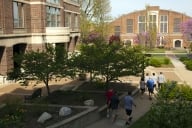You have /5 articles left.
Sign up for a free account or log in.
WASHINGTON -- Over the last year, college and university leaders have grappled with provocateurs who effectively shut down campuses with their appearances and tap deeply into the institutions’ pocketbooks.
Administrators have not yet figured out how to handle a speech by white supremacist Richard Spencer, for instance, and those like him, without spending hundreds of thousands of dollars on security to monitor possible protests. Though not every controversial speaker will generate a crowd, some campus protests have turned bloody .
But academe is adapting, according to administrators speaking at the Association of Public and Land-grant Universities’ annual meeting Monday. They offered tips on managing controversial speakers. Often, this is done facing a student body that does not fully embrace the First Amendment or its principles and would rather see someone like Spencer simply barred from the grounds, an option not available to public universities.
Universities must plan early and talk to and understand students -- which involves communicating in detail about an event and a visible declaration against racism and bigotry, the panel said.
“You have to realize people’s emotions -- they are hurt,” said Sarah Mangelsdorf, provost and vice chancellor for academic affairs at the University of Wisconsin at Madison. “And you need to respond with the psychologist in you. Because if you start with your legal argument, then you’ve lost their hearts.”
Mangelsdorf floated the idea that students be taught about free expression early in their college experience, perhaps during orientation. She told a reporter after the panel that students often don’t grasp how free speech was key, for example, in the civil rights movement, and what the benefit of unpopular speech was during that time in the southern parts of the country.
High school students have often operated under a “speech code” and stringent antibullying campaigns and carry those ideals with them to universities, Mangelsdorf said, referencing a point made in the new book Free Speech on Campus (Yale University Press), authored by Erwin Chemerinsky, dean of the law school at the University of California, Berkeley, and Howard Gillman, chancellor and professor of law, political science and history at UC Irvine.
Thus, establishing relationships with students to learn their backgrounds and motivations -- both those protesting the speakers and those intent on hosting firebrands on campus -- can help, said Robin Holmes-Sullivan, vice president for student affairs for the University of California’s Office of the President. Conservative students who feel comfortable might alert administrators before an event, in turn eliminating administrators' need to scramble together a security plan at the last minute, Holmes-Sullivan said.
Longer prep time for such speakers can lead to relative success, said Lee Tyner, general counsel at the University of Mississippi, pointing to the University of Florida’s handling of a talk by Spencer last month. The institution, though it dropped roughly $600,000 on police power and security measures, planned every detail so thoroughly that it avoided all but minor scuffles -- though three Spencer supporters were arrested for firing a gun at a small gathering of protesters (they missed).
Compare this to Berkeley, one of the earliest examples this year of a campus spurred to violence after a hot-button speaker, former Breitbart editor Milo Yiannopoulos, was invited there in February. Destruction was widespread -- fires were set, and cops had rocks and fireworks thrown at them.
The University of Florida, before Spencer's scheduled appearance, set up a full question-and-answer webpage addressing everything from the open campus routes to class schedules.
Communication, both far in advance of a speech and the day of it, is essential, too, said Dana Topousis, a spokeswoman for UC Davis. Topousis described a nerve center of sorts during such events, with her working alongside both her provost and chief of police to combat false information in real time.
Breitbart would publish fake and inflammatory details, and Topousis would ask the provost and police chief for permission to respond with the facts, some of which big-time outlets such as The Washington Post would pick up on and report correctly, she said.
(Topousis did not refer to a specific event in her remarks. UC Davis canceled a January appearance by Yiannopoulos and former pharmaceutical executive Martin Shkreli after consulting with the university police department.)
Communications staffers can also help craft a message that highlights campus values and can assuage some students' worries, Topousis said. She said students distrust silence, believing that it somehow reflects a tacit agreement with a viewpoint.
Some presidents have also been criticized for being too “sterile” in their statements by not directly referencing racism or white supremacy. This was particularly the case for Teresa Sullivan, the outgoing president of the University of Virginia, who did not name Spencer or his followers in the days leading up to their march on the campus in August. The next day was the fatal demonstration in the city of Charlottesville.
“If you’re not out there with those students on social media, it looks like you’re not being responsive,” Topousis said. “As a communicator … bring us in early and keep us a part of those discussions.”
Social media platforms also allow administrators to tune in to chatter about rallies, the panelists said.
Some colleges have reworked their policies after appearances by divisive speakers, notably Texas A&M University, which decreed only affiliated student groups could invite outsiders to campus, a change from the open-door policy it once had.
Tyner of the University of Mississippi called this strategy “making yourself a smaller target” of such groups.
In an interview with Inside Higher Ed Monday, University of Florida President W. Kent Fuchs said he was reluctant to impose such a rule like Texas A&M’s, pointing out space in Gainesville, site of the university, is limited. Fuchs said he does not want to keep out the high schools, which often rely on their facilities.
Michael O’Quinn, vice president for government relations at Texas A&M, during the panel called the new Texas A&M regulation “sad.” Administrators lamented the “abuse” that ultimately led to them restricting their facilities, he said.
But institutions can’t continue to shell out so much money for these speakers, Holmes-Sullivan said.
Berkley spent more than $800,000 on Yiannopoulos’s last appearance in October, and $600,000 on right-wing author Ben Shapiro's talk just a couple weeks prior.
The bulk of security costs can’t be levied to the speaker, Tyner said. On paper a policy that charges speakers might appear to be legally sound. But in practice, if the university ends up treating two groups differently -- a gospel choir, for instance, versus Spencer’s group -- then the policy wouldn’t survive a court challenge.
A policy that bases a security fee on crowd size, though, more likely would hold up to legal scrutiny, Tyner said.
He stressed, though, that a free speech argument should never dissuade a campus from protecting its students, and colleges can regulate conduct -- forcing attendees to remove masks or extinguish torches, and the most obvious being weapons shouldn’t be allowed onto campus. Tyner said universities can even limit access to certain buildings for particular purposes.
Over all, the situation on college campuses mirrors the growing hyperpartisan nature of the country, O’Quinn said. And it has captured the attention of the public and of legislators. O’Quinn said he would much rather be lobbying his state lawmakers on funding rather than having conversations about possible free speech bills. He also said politicians to the left and the right have urged Texas A&M to keep Spencer out.
In Wisconsin, amid worries that the state Legislature would pass a bill regulating campus free expression, the University of Wisconsin System Board of Regents approved a policy that prescribes punishments for students who disrupt speakers -- after a second strike, they are suspended, for a third, they are expelled.
Mangelsdorf, from Madison, said she believed the regents were “trying to do something,” but ultimately the policy they passed was “unnecessary,” she said, adding -- sarcastically -- that everyone knows how well mandatory sentencing guidelines work.
“We are living in interesting times,” she said.








